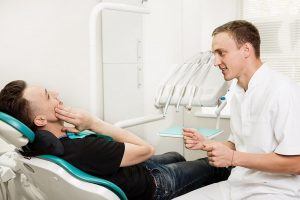Tired of Tossing and Turning with Jaw Pain? The Link Between TMJ and Sleep Apnea
Do you wake up with a sore jaw and feeling exhausted, even after a full night’s sleep? The culprit might be a surprising connection between TMJ disorder and sleep apnea. At Lake Country Dental, a top dental practice in Fort Worth, TX, we understand this complex relationship.
Serving Fort Worth and surrounding communities like Saginaw, White Settlement, and Azle, Dr. Snider and his team offer comprehensive solutions to address both conditions and help you achieve restful sleep and a pain-free jaw. Call us today at 817-236-8771 to schedule a consultation and discover the path to a healthier, more revitalizing sleep.
Understanding Sleep Apnea: When Breathing Takes a Timeout
Sleep apnea is more than just snoring. It’s a serious sleep disorder that disrupts your breathing while you sleep, leading to repeated pauses in airflow. These pauses can last from a few seconds to minutes and can occur many times throughout the night.
There are two main types of sleep apnea:
- Obstructive Sleep Apnea (OSA): This is the most common type. It happens when the muscles in the back of your throat relax too much during sleep, causing the airway to narrow or close. Despite efforts to breathe, air can’t flow freely, leading to a drop in oxygen levels and brief awakenings to reopen the airway.
- Central Sleep Apnea: This less common type occurs when the brain fails to send the proper signals to the muscles that control breathing. This leads to pauses in breathing without any physical obstruction in the airway.
The TMJ-Sleep Apnea Connection
While seemingly distinct, TMJ disorder and sleep apnea often intertwine, with one condition exacerbating the other.
How TMJ Disorder Can Contribute to Sleep Apnea
- Jaw Position: Misalignment of the jaw can narrow the airway, making it difficult to breathe during sleep.
- Muscle Tension: TMJ disorder often involves tense jaw muscles, which can extend to the muscles involved in breathing, further obstructing the airway.
- Teeth Grinding: Many individuals with TMJ disorder grind their teeth at night (bruxism). This can cause the jaw to shift and worsen airway obstruction.
How Sleep Apnea Can Worsen TMJ Disorder
- Increased Jaw Clenching: When breathing is interrupted during sleep, the body’s natural response is to clench the jaw in an attempt to open the airway. This repetitive clenching can strain the TMJ.
- Reduced Oxygen to Jaw Muscles: Sleep apnea reduces oxygen levels in the blood, which can affect the health and function of jaw muscles.
- Sleep Disruption: Poor sleep quality caused by sleep apnea can increase stress and tension, leading to more jaw clenching and grinding.
Real Patient Reviews for Dr. Snider in Fort Worth
At Lake Country Dental in Fort Worth, TX, we believe the best testament to our care is the satisfaction of our patients. Here’s what some of them have to say about their experience with Dr. Snider and our team:
- “Dr. Snider is a fantastic dentist. He provides absolutely the best dentistry and always does what is best for his patients. I trust him completely.” – Rick S.
- “Lake County Dental makes you, and your family, feel special. They remember your name, your kid’s name, and your spouse’s name. I travel over 30 minutes to give Lake Country Dental my business because when you find a place that treats you and your family like they are the most important patients that day, you keep going no matter the distance.” – Thomas K.
Call Lake Country Dental at 817-236-8771 to schedule your consultation and see for yourself why we’re one of the best dental offices in Fort Worth.
Recognizing the Signs of TMJ and Sleep Apnea
It’s crucial to be aware of the symptoms of both TMJ disorder and sleep apnea:
TMJ Disorder Symptoms:
- Jaw pain and tenderness
- Clicking or popping sounds in the jaw
- Limited jaw movement
- Headaches
- Earaches and tinnitus
- Facial pain
Sleep Apnea Symptoms
- Loud snoring
- Gasping or choking during sleep
- Pauses in breathing during sleep
- Excessive daytime sleepiness
- Morning headaches
- Difficulty concentrating
Treatment Options for Sleep Apnea and TMJ
There’s several of treatments to address both TMJ disorder and sleep apnea:
- Oral Appliances: Custom-fitted oral appliance therapy can reposition the jaw and tongue to keep the airway open during sleep, effectively treating both conditions.
- TMJ Therapy: Dr. Snider may recommend therapies like oral splints, physical therapy, and lifestyle changes to manage TMJ pain symptoms.
- CPAP Therapy: For moderate to severe sleep apnea, Dr. Snider may recommend Continuous Positive Airway Pressure (CPAP) therapy, which uses a machine to deliver a constant stream of air to keep the airway open.
- Lifestyle Modifications: Changes like weight loss, avoiding alcohol and sedatives before bed, and sleeping on your side can improve both conditions.
Frequently Asked Questions
Who should I see if I suspect I have TMD or sleep apnea?
If you think you might have TMD or sleep apnea, it’s important to see your doctor or dentist. They can examine you and refer you to the right specialist. This might be a sleep specialist for sleep apnea or an oral and maxillofacial surgeon for TMD, depending on your symptoms.
Will treating sleep apnea help with TMD?
Yes, treating sleep apnea can often improve TMD symptoms. Sleep apnea treatment, such as using a CPAP machine, can reduce stress on your jaw joint while you sleep. This can lead to less pain and better jaw movement for people with TMD.
Discover the Connection Between Jaw Pain and Untreated Sleep Apnea
Are you tired of waking up exhausted and facing the day with jaw pain? At Lake Country Dental in Fort Worth, TX, we understand the interconnectedness of TMJ disorder and sleep apnea. Dr. Snider and our compassionate team are here to help you find the relief you deserve.
Don’t let these conditions control your life. Call us now at 817-236-8771 to schedule a consultation and take the first step towards restful sleep and a healthy jaw.



 817-236-8771
817-236-8771








